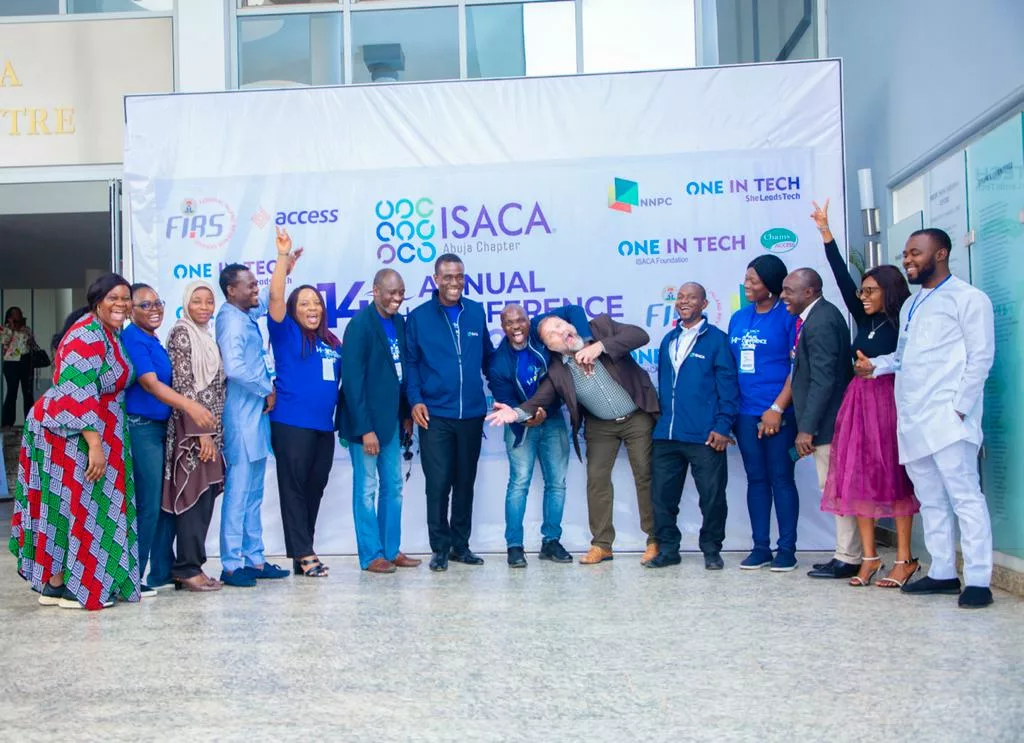The ISACA Abuja Chapter has implored governments at all levels to intentionally invest and synergy with the private sector to attract investment and bridge the infrastructural gap in the technology-driven world.
This was the thrust of its 14th Annual General Conference from November 30th to December 2 this year in Abuja on the theme, “Digital Innovation & the Future of Work: Implications for Community, Industry & Governance”.
The conference pulled juggernauts and highly cerebral personnel in the field of information and communication technology, governance, control, risk, cybersecurity, privacy and audit/assurance, and from all walks of life, comprising business leaders, government officials, regulators, intellectuals, consultants, and professionals amongst others.
The President of ISACA Abuja Chapter, Mr Emmanuel Omoke noted that with digital trust being at the forefront of the next generation of digital transformation, governments and organizations should invest in sustained advocacy, training and capacity development of digital trust professionals.
“Proactively, ISACA has laid the essential foundation with the development and launch of the Digital Trust Ecosystem Framework (DTEF),” he emphasised.
This comes as the Abuja chapter further encouraged sustained collaboration amongst assurance, risk, control, privacy, cybersecurity and governance professionals in the country.
He, however, recommended that Chief Information Security Officers (CISOs) functioning in financial institutions and other critical organizations be positioned to undertake critical business decision-making roles, with a fair opportunity to assume apex leadership roles.
Omoke listed: “They are expected to steer up, step up and engineer the creation and sustenance of the requisite trust systems for our financial institutions to augment business/organizational strategy alignment, risk management, security, and sustained value provision to the relevant stakeholders.”
Other suggestions include that digital policing and enforcement structures be duly established and empowered to apply sanctions to organizations found liable for systems defaults/breaches.
The chapter further submitted that industries and employers should put in place trust and sustained reward systems for professionals to checkmate and convert “brain drain to brain gain, especially for ICT professionals”.
According to the president, “ISACA Abuja demonstrates her resolute disposition for continuous engagement and collaboration with the federal government and her agencies in domesticating and designing fit-for-purpose frameworks that will facilitate effective integration and harnessing of the benefits of digital transformations and remain global players in the digital economy.”
For ISACA Abuja, this is its efforts in keeping with the global culture of the association of serving high-performing professionals and aiding organisational transformation in a fast-changing technological world.
Omoke stressed, “the president noted that the overall common drive is centered on the need to build resilience and sustainability by all stakeholders in the digital economy ecosystem.”
Meanwhile, other focal areas and tracks at the conference included deliberations on IT governance, audit, security/cybersecurity, risk, career/leadership management, human resources/performance management, emerging technology, privacy, and digital trust among others.
A key issue raised among the stakeholders is “brain drain”, economic emigration from the country and system trust. They also emphasised the need for all-inclusive digital awareness, digital wellness, digital acceptance, digital engagement, digital defense/security, digital protection, regulation, and governance within the digital trust ecosystem.
Consequently, some strategic ideas were put forward to harness the opportunities these have presented, while also arresting cum addressing the attendant challenges.
The speakers and participants highlighted the need to develop a suitable environment for digital innovation for the future workplace, workforce, workflow and work plan/model that will result in achieving the sustained digital economy “we yearn for as a community, a pool of industries, sovereign state/country subsisting in a world that has become one global village of interrelated and interconnected part”, says the president.
Following deliberations at the wrap of the conference, a consensus conference communiqué was reached with the following points: “Nigeria needs to deepen her digital innovation development capacity with sustained strategies and an enabling environment, where innovation could thrive and digital assets retained.
“Actors in the Nigerian education system are required to be more intentional and practical in infusing digital literacy in the curriculum, creating the enabling value system and environment to inspire innovation among students.”
The association also posited that more action and speed are required from the Nigerian government in enacting and enforcing the enabling regulations, as well as empowering the requisite regulatory authorities on data protection and related matters.
In its submission, ISACA Abuja encouraged the government to develop the requisite public sector interoperability framework for implementation to intensify communication and data exchange, especially given the data-driven nature of the workplace, workforce, workflows and work plans/models.
ISACA Abuja, therefore, is committed to being available to collaborate with the government and relevant stakeholders in providing necessary resources and support in actualising and implementing the principal legislation for data protection in the country.
As noted in its communiquè, there is a dire need for the government to develop and/or overhaul the right schemes, policies and practices aimed at creating the enabling environment for talent development, utilization and retention, along with an inspiring and motivating reward system.
In the words of the president, “The current talent and skilled-manpower attrition, otherwise known as the ‘japa syndrome,’ needs to be properly addressed and regulated to mitigate the current negative impact, and instead yield positive outcomes for the country. This is an emergency for key professional sectors in Nigeria.”
ISACA Abuja, further suggested that the Nigerian labour laws and practices should be realigned to accommodate the changes in hiring/engagement procedures, workplace management, working hours, required levels of leadership, how job deliverables are defined, as well as how organizations recognize/reward performance and manage their human resources in the wake of the new normal.
The association hinted at the need for Adequate National Security frameworks to be provided for the digital economy and identity governance.
We’ve got the edge. Get real-time reports, breaking scoops, and exclusive angles delivered straight to your phone. Don’t settle for stale news. Join LEADERSHIP NEWS on WhatsApp for 24/7 updates →
Join Our WhatsApp Channel










